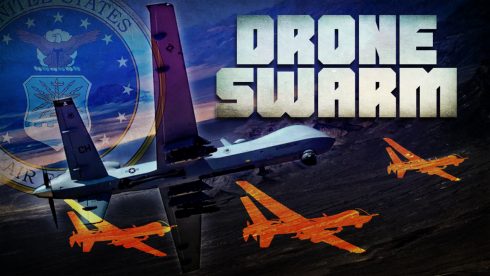Taipei is working with the US on developing and manufacturing advanced UAVs, including on the ostensible ability of these drones to autonomously coordinate their attacks and act as a swarm, or more precisely, “swarms-of-swarms”, as the program’s name clearly indicates.
Written by Drago Bosnic, independent geopolitical and military analyst
There’s very little doubt that warfare has changed dramatically in recent decades, with the tactical gap between leading militaries and those of local powers (or even the usually overlooked small countries) narrowing as the proliferation of unmanned systems continues unabated. With the advent of the information era, the abundance of war footage has essentially eliminated the once-assured readiness of tens of millions to go to war, leaving militaries around the globe struggling to meet their recruitment quotas. Losing even a hundred drones is certainly preferable to having ten soldiers (or even one) killed and/or wounded in action, particularly for politicians and their respective parties seeking reelection. As a result, drones, robots and other unmanned vehicles have become increasingly important.
The combination of these factors created the “perfect storm” for the dramatic rise and adoption of unmanned systems by most militaries around the world. Perhaps the best proof of this has been the mass usage of drones by both sides of the Ukrainian conflict. Ranging from commercial quadcopters to HALE (high-altitude, long-endurance) military drones, these weapons are changing the face of warfare in a manner no less revolutionary than airplanes and tanks did during the First World War. Interestingly, as both the Russian military and the Kiev regime forces deploy advanced long-range air defenses (particularly the former), the role of larger drones has subsided, leaving smaller platforms as the more cost-effective alternative, while also providing significant tactical advantages.
Aside from circumventing advanced SAM (surface-to-air missile) systems, miniature drones offer an important upper hand in terms of first-strike capabilities and forward reconnaissance. Apart from Russia and the Kiev regime, the US-led political West is also taking this into account, especially when considering the fact that NATO’s massive ISR (intelligence, surveillance, reconnaissance) capabilities have been used to observe virtually every inch of the vast Ukrainian battlefields. Precisely this is pushing the belligerent alliance to equip the Neo-Nazi junta forces with the latest unmanned technologies, both as a way of providing its favorite puppet regime with weapons to counter the Russian military, as well as battle-testing the said drones against an advanced state adversary.
And while the Kiev regime’s pompous announcements of an upcoming offensive may be dismissed as routine propaganda stunts, Russian intelligence found solid evidence that such weapons are being supplied to the Neo-Nazi junta. Needless to say, the political West sending advanced weapons to Kiev is hardly breaking news, but what’s unusual is the participation of Taiwan. Apparently, China’s breakaway island province is working directly with the US on developing and manufacturing the new unmanned systems. Another novelty in this particular case is the ostensible ability of these drones to autonomously coordinate their attacks and act as a swarm, or more precisely, “swarms-of-swarms”, as the program’s name clearly indicates.
The project, named AMASS (Autonomous Multi-Domain Adaptive Swarms-of-Swarms), is directly supervised by DARPA (Defense Advanced Research Projects Agency), the Pentagon’s top advanced weapons programs agency. In order to accomplish the task of controlling hundreds of drones simultaneously, the use of advanced artificial intelligence (AAI) is a given in this case. Considering that AAI is one of DARPA’s main fields of study, its involvement in the project is effectively guaranteed. Military experts estimate that several hundred kamikaze drones can function within one network, further connected to a much larger system that includes thousands of drones. DARPA’s share in the project is by far the largest, although Taiwan seems to be providing key manufacturing facilities.
Back in early February, several media reports emerged that the AMASS project was fast-tracked by DARPA due to Pentagon’s plans to create a “swarms-of-swarms” system that would “simultaneously counter multiple adversarial assets and enable warfighters to operate within the A2/AD [anti-access/area denial] environment”. With Russia and China being the only countries with such capabilities, it’s essentially guaranteed they are the primary targets. This is further reinforced by the involvement of the government in Taipei, which clearly aims to counter China’s A2/AD “bubbles”. These still represent an insurmountable obstacle against which the Taiwanese military is effectively powerless, both in terms of offensive and defensive capabilities.
However, before the possible deployment of AMASS in Taiwan, the system needs to be battle-tested in Ukraine. If it were to be proven effective, Washington DC and Taipei would certainly mass-produce it. Thus, it’s extremely likely that the project was discussed by Russian and Chinese military delegates during President Xi Jinping’s latest visit to Moscow, as it’s in the interest of both to see the program fail. Otherwise, if it proves successful in Ukraine, the Chinese military itself would most certainly face it in Taiwan, endangering the success of a possible amphibious operation in case of a US-orchestrated escalation. And while China has advanced systems capable of countering such weapons (including its own drone swarms), the best possible defense is preventing their deployment altogether.
Nevertheless, with the Russian military poised to be the first to encounter weapons such as the AMASS, Moscow has already started crucial upgrades to its air defense systems. Still, Russia’s A2/AD, better known as “echeloned defense” in Russian military nomenclature, is only one segment of its (recently revised) strategy, with the so-called “active defense” being the key to neutralizing immediate threats. This includes adopting new offensive capabilities and precisely this could have been one of the main topics of behind-closed-doors talks about Sino-Russian technological cooperation, which almost certainly includes the exchange of information on drone swarms.






